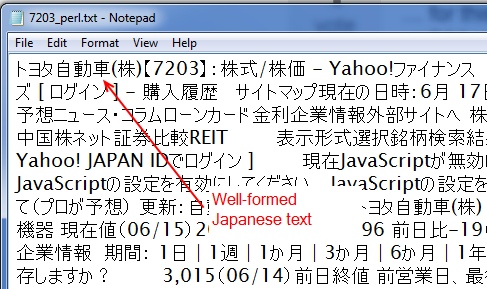Using R, I am trying to scrape a web page save the text, which is in Japanese, to a file. Ultimately this needs to be scaled to tackle hundreds of pages on a daily basis. I already have a workable solution in Perl, but I am trying to migrate the script to R to reduce the cognitive load of switching between multiple languages. So far I am not succeeding. Related questions seem to be this one on saving csv files and this one on writing Hebrew to a HTML file. However, I haven't been successful in cobbling together a solution based on the answers there. Edit: this question on UTF-8 output from R is also relevant but was not resolved.
The pages are from Yahoo! Japan Finance and my Perl code that looks like this.
use strict;
use HTML::Tree;
use LWP::Simple;
#use Encode;
use utf8;
binmode STDOUT, ":utf8";
my @arr_links = ();
$arr_links[1] = "http://stocks.finance.yahoo.co.jp/stocks/detail/?code=7203";
$arr_links[2] = "http://stocks.finance.yahoo.co.jp/stocks/detail/?code=7201";
foreach my $link (@arr_links){
$link =~ s/"//gi;
print("$link\n");
my $content = get($link);
my $tree = HTML::Tree->new();
$tree->parse($content);
my $bar = $tree->as_text;
open OUTFILE, ">>:utf8", join("","c:/", substr($link, -4),"_perl.txt") || die;
print OUTFILE $bar;
}
This Perl script produces a CSV file that looks like the screenshot below, with proper kanji and kana that can be mined and manipulated offline:

My R code, such as it is, looks like the following. The R script is not an exact duplicate of the Perl solution just given, as it doesn't strip out the HTML and leave the text (this answer suggests an approach using R but it doesn't work for me in this case) and it doesn't have the loop and so on, but the intent is the same.
require(RCurl)
require(XML)
links <- list()
links[1] <- "http://stocks.finance.yahoo.co.jp/stocks/detail/?code=7203"
links[2] <- "http://stocks.finance.yahoo.co.jp/stocks/detail/?code=7201"
txt <- getURL(links, .encoding = "UTF-8")
Encoding(txt) <- "bytes"
write.table(txt, "c:/geturl_r.txt", quote = FALSE, row.names = FALSE, sep = "\t", fileEncoding = "UTF-8")
This R script generates the output shown in the screenshot below. Basically rubbish.

I assume that there is some combination of HTML, text and file encoding that will allow me to generate in R a similar result to that of the Perl solution but I cannot find it. The header of the HTML page I'm trying to scrape says the chartset is utf-8 and I have set the encoding in the getURL call and in the write.table function to utf-8, but this alone isn't enough.
The question How can I scrape the above web page using R and save the text as CSV in "well-formed" Japanese text rather than something that looks like line noise?
Edit: I have added a further screenshot to show what happens when I omit the Encoding step. I get what look like Unicode codes, but not the graphical representation of the characters. It may be some kind of locale-related issue, but in the exact same locale the Perl script does provide useful output. So this is still puzzling.
My session info:
R version 2.15.0 Patched (2012-05-24 r59442)
Platform: i386-pc-mingw32/i386 (32-bit)
locale:
1 LC_COLLATE=English_United Kingdom.1252
2 LC_CTYPE=English_United Kingdom.1252
3 LC_MONETARY=English_United Kingdom.1252
4 LC_NUMERIC=C
5 LC_TIME=English_United Kingdom.1252
attached base packages:
1 stats graphics grDevices utils datasets methods base



Encoding(txt) <- "bytes"and it works well in my environment. – JotaEncoding(); unfortunately I was unsuccessful. – Insistence